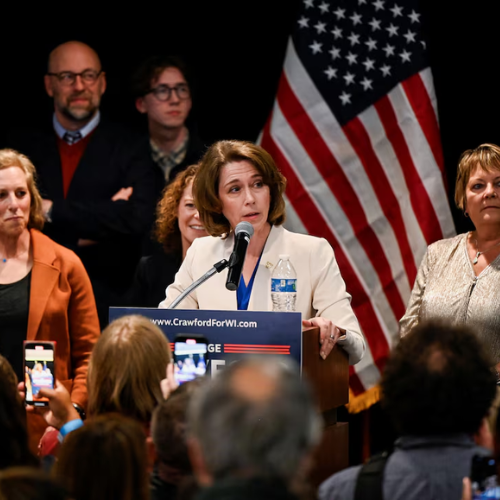Wisconsin voters have made their choice, electing Democratic-backed judge Susan Crawford to the state Supreme Court in what has become the most expensive judicial race in American history. This election saw over $100 million spent by candidates and their supporters, with a significant portion coming from billionaire businessman Elon Musk, who strongly backed conservative candidate Brad Schimel.
Crawford, a former private lawyer for Planned Parenthood and a current Dane County judge, secured around 55% of the vote, while Schimel, a Waukesha County judge and former Republican attorney general, lagged behind at 45%. The race was crucial because it determined the balance of power in Wisconsin’s highest court, which now remains under liberal control with a 4-3 majority.
Musk’s Influence and Controversial Tactics
One of the most debated aspects of this election was the deep involvement of Elon Musk, who poured around $20 million into Schimel’s campaign. His support for the conservative candidate was not just financial; he personally visited the state, handed out large sums of money, and launched initiatives to rally voters to his preferred side.
How Billionaires Are Secretly Buying Elections – Sanders Speaks Out Against Shocking Corruption
This level of direct political involvement from one of the world’s richest individuals sparked backlash. Attack ads targeting Musk flooded Wisconsin’s airwaves, warning voters about his influence. Many citizens, particularly in the Democratic-leaning city of Milwaukee, expressed concern that billionaires were trying to buy political outcomes. Some voters at a local basketball game openly criticized Musk’s role, arguing that extreme wealth should not dictate democracy. Milwaukee Bucks fan Mike McClain referred to Musk as “the real president,” questioning how a billionaire could influence elections so heavily.
The campaign also saw some highly unusual strategies. During a rally, Musk handed out two separate $1 million checks to individuals who signed a petition against so-called “activist judges.” Additionally, he promised $50 to anyone who shared a photo outside a polling station holding up a sign supporting Schimel. These actions fueled debates over ethics and election integrity.
Voter Turnout and Broader Impact
Turnout in the election was historic, leading to ballot shortages in some areas. Milwaukee officials reported an unprecedented demand, causing temporary delays as polling stations ran low on supplies. This turnout demonstrated how crucial this race was for Wisconsin residents, who understood that the court’s future decisions would directly affect key issues like voting laws and congressional district maps.
Wisconsin voters also passed a constitutional amendment requiring voter identification, reinforcing an existing state law that had been debated for years. Crawford opposed this amendment, arguing it could make voting harder for some residents. Now, with the law enshrined in the state’s constitution, it will be more difficult to challenge or change in the future.
Election Scandal: Trump Slams $21M U.S. Funding for India’s Voter Turnout
Crawford benefited from large donations by billionaire donors, including financier George Soros, Illinois Governor JB Pritzker, and LinkedIn co-founder Reid Hoffman. However, Musk outspent them all in his efforts to influence the race.
This race’s outcome is expected to have major political consequences, especially concerning the state’s representation in Congress. Wisconsin’s Supreme Court may soon hear cases related to congressional redistricting, a process that could shift the balance of power in the U.S. House of Representatives. Currently, Republicans hold six of Wisconsin’s eight congressional seats, and any future legal challenges could reshape those numbers.
Musk’s massive financial push did not go entirely unrewarded, as Republican candidates Jimmy Patronis and Randy Fine managed to retain two congressional seats in Florida in other elections held on the same day. However, his failure to secure a conservative victory in Wisconsin’s Supreme Court race raises questions about how much influence money alone can have in shaping election results.
For now, Wisconsin’s highest court remains under liberal control, and Musk’s costly gamble has ended in disappointment.


